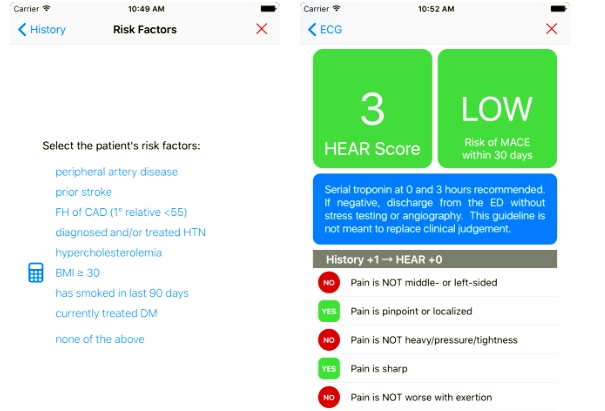23 June 2016. A new iPhone app helps emergency physicians decide whether a patient with chest pain can be safely discharged from a hospital or needs further tests. The Heart Pathway app, developed by Wake Forest Baptist Medical Center in Winston-Salem, North Carolina, is available for free from the iTunes App Store.
Chest pain is among the most frequent reasons for visiting hospital emergency rooms, accounting for some 8 million visits each year in the U.S., with physicians in almost every shift called on to diagnose patients with chest pain. In most cases, say the app’s developers, patients with chest pain receive lengthy cardiac evaluations, but only a small percentage of patients are at risk for serious cardiac events. Nonetheless, the fear of missing serious heart problems and threat of malpractice litigation results in patients often receiving extensive tests.
Heart Pathway incorporates a protocol developed at Wake Forest Baptist to more efficiently evaluate patients complaining of chest pain and provide emergency room clinicians with better information to make their decisions. The protocol considers 5 variables: patient history, electrocardiogram or ECG, age, other risk factors, and levels of troponin in the blood. Troponin is a protein released when heart muscle is damaged.
A Wake Forest Baptist team led by emergency medicine professor Simon Mahler converted the protocol to digital logic for coding into the Heart Pathway app. The app and protocol compute a composite score from the history, ECG, age, and risk factors to a scale of 0 to 7, with a recommendation to test for troponin. If the patient shows normal troponin levels after a series of tests, and the composite score is 3 or less, the risk of a major cardiac event within 30 days is less than 1 percent. Individuals meeting those conditions are recommended for discharge.
Mahler and colleagues tested the Heart Pathway protocol in a clinical trial with 282 patients admitted to Wake Forest Baptist’s emergency department complaining of chest pains, randomly assigned for evaluation by Heart Pathway or usual care procedures following professional guidelines. The results show patients evaluated with Heart Pathway experienced shorter hospital stays, 12 percent fewer cardiac tests, and 21 percent more early discharges. In addition, no patients identified for early discharge had major adverse cardiac events within 30 days.
Mahler says in a Wake Forest Baptist statement that the “app is the manifestation of our validated patient protocol in digital form.” He adds,”This gives emergency department providers an easy way to apply an already proven method for evaluating patients who present with chest pain in a way that reduces length of stay and unnecessary testing.”
Data from the app can be integrated into some electronic medical record systems with a package written by Decision Point Informatics, a partner company licensing the Heart Pathway technology.
Read more:
- Report from Maker Faire: Wrist Band Takes Blood Pressure
- Sensor Patch Tracks Chemical, Physical Vital Signs
- Personalized Heart Model Devised for Treatment Decisions
- Crowdsourcing Yields Heart Disease Algorithm
- EKG Technology Integrated into Apple Watch Band
* * *


 RSS - Posts
RSS - Posts
You must be logged in to post a comment.